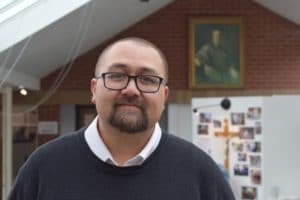Relationships are key to ministering to Māori, particularly when discussing getting vaccinated against the Covid-19 virus.

Auckland Vicar for Maori Manuel Beazley
Auckland Vicar for Māori Manuel Beazley said that many of the Catholic parishes in the region are actively promoting vaccination, and were involved in the Super Saturday Vaxathon held on October 16.
“There is a big push in south Auckland, many of the Catholic parishes in the region are intimately involved with vaccination events. Parishes have been actively promoting that their parishioners get vaccinated,” he said.
“South Auckland has high numbers of Māori and Pacific peoples, they are among the most vulnerable because many have other health-related issues. There are big households in this part of Auckland,” he said, noting that the Government has stressed that household transmission is by far the most common form of transmission of the virus in this current outbreak.
“Needless to say, if Covid-19 gets its way in south Auckland, it would be catastrophic,” he said.
Mr Beazley said that various Iwi, hapu and marae around the country are also doing their bit.
“They need looking after too. They also need affirmation, to know that they are making a difference,” he said.
The Ministry of Health said that the event resulted in 10,825 Māori getting their first dose, and a further 10,877 their second dose. Overall, as of October 23, 68.7 per cent of the Māori population, or 392,000 people, had had their first dose – 275,000 of those are fully vaccinated.
There were 560 Covid-19 cases recorded in total in the Māori community.
Mr Beazley said, while there may be hesitancy to the vaccine for some, he believes the problem is more of an accessibility issue.
“Our vaccine booking system works when you have access to a laptop or smartphone and good Internet connection. Drive-through vaccination stations are good if you’re not too far from it or if you have a vehicle that is registered and has gas to travel – or a vehicle in the first place. Many of our rural and isolated communities are predominantly Māori, [and] there are issues of access to vaccination centres in those places,” he said.
Access to accurate and reliable information is also an issue.
“For Māori, who is saying it is just as important as what’s being said. There is a trust issue here,” he said, explaining that Māori had been let down by institutions in so many ways.
“There is a deep mistrust by many Māori towards institutions and so, when the Government through the Ministry of Health, Ministry of Education or any other government ministry or agency, starts to direct people to take up the vaccine, understandably, Māori are very dubious,” he added.
This is why, he said, Māori need to provide leadership in this.
“Where Māori are really lagging in the vaccination rates is in the younger demographics. Young people will take notice of other influential young people. That is no different for young Māori. Influential young people need to be utilised in this process, they speak the language. Older people, even well-meaning older people, just don’t have the street-cred, as it were, to break the generational barrier. It just feels like been told off, or told what to do,” Mr Beazley said.
In ministering to, as well as engaging with, those who are against vaccination, Mr Beazley said it should be done “one to one”.
“We need to listen to the reason why a person is not choosing to be vaccinated. In the Māori worldview, we have the elements of Pono, Tika and Aroha. This must inform and guide our interaction,” he said.
He said, when observing Pono, one listens, not only to the words, but to “their heart – what they are feeling”.
Responding with Tika means responding in a way that is respectful, putting before them accurate and reliable information, and not forcing one’s opinion on them.
“When Pono and Tika have been followed, the result is always aroha – there is a new-found communion between people because they have heard each other, they have been free to interact without fear of judgement or coercion, and the product of that is aroha – communion, respect, compassion,” Mr Beazley said.
Mr Beazley suggested to those ministering to Māori to “get to know their story”.
“Building strong relationships is the key towards dialogue, reciprocity and trust,” he said.
Reader Interactions